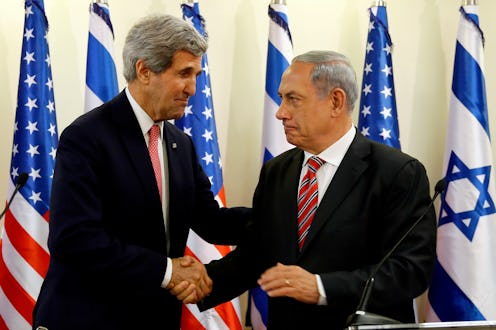News
Kerry Reassures Israel on Iran Nuclear Deal
Just over a week after an international nuclear deal was negotiated with Iran, secretary of state John Kerry was back in Israel Wednesday and Thursday, reassuring Israeli prime minister Benjamin Netanyahu that the two countries are "absolutely in sync" about preventing Iran from acquiring a nuclear weapon. In their first meeting after the deal was signed, Kerry and Netanyahu talked for over ten hours in an attempt to figure out the first steps towards easing Israel's concerns about Iran's potential to progress towards developing nuclear weapons. The duo also touched on Israel's peace negotiations with the Palestinians, of which Kerry gave a cautiously optimistic prognosis to the press.
Kerry said that,"we are closer than we have been in years" to a peace deal between Israel and Palestinian authorities. This estimation contradicts information from other sources, who say that the Israeli far-right's insistence on continuing settlement building in the West Bank squanders and possibility of meaningful peace talks. Last month, Palestinian negotiators resigned from the talks precisely because of those issues.
"The people who really know what's going on [in the negotiating room] are not talking about it. The fact that no information is coming out doesn't mean the talks are not productive," Kerry said at the press conference.
Asked about the Iran deal, Kerry insisted on Netanyahu's right to criticize agreements he felt were not in his country's best interests. Yet, Kerry also insisted that there is "not an ounce of daylight between us with respect to the need to make sure that Iran cannot achieve a nuclear weapons, will not in the future be able to achieve it, and certainly cannot move toward it without the United States and Israel knowing that, and therefore being able to take steps to deal with it." (Those assurances are unlikely to allay Netanyahu's fears.)
International negotiators reached a short-term nuclear deal with Iran in late November, after a series of false starts and failed agreements. Under the terms of the agreement, Iran will only enrich uranium enough to be used for nuclear energy, and international sanctions against the country will be eased. Though the deal stipulates a term of only six months, Israel was less than pleased with the agreement.
“What was achieved last night in Geneva is not an historic agreement, but an historic mistake,” Netanyahu said at the time. “Today the world has become a much more dangerous place because the most dangerous regime in the world has taken a significant step toward attaining the most dangerous weapon in the world.”
Congress and Saudi Arabia were also miffed by the deal (if you'll recall, Saudi Arabia and Iran are supplying fighters to opposite sides of the Syria conflict), but their concerns are secondary.
